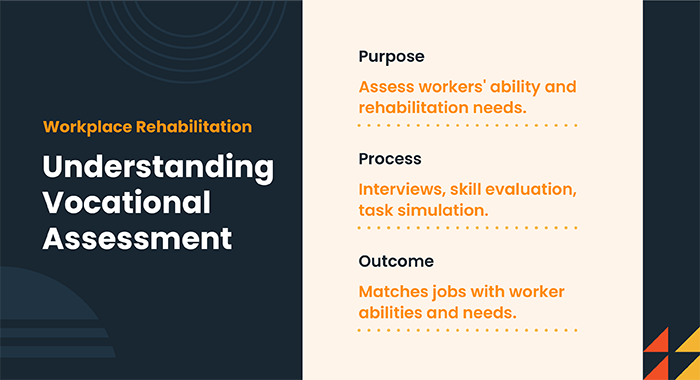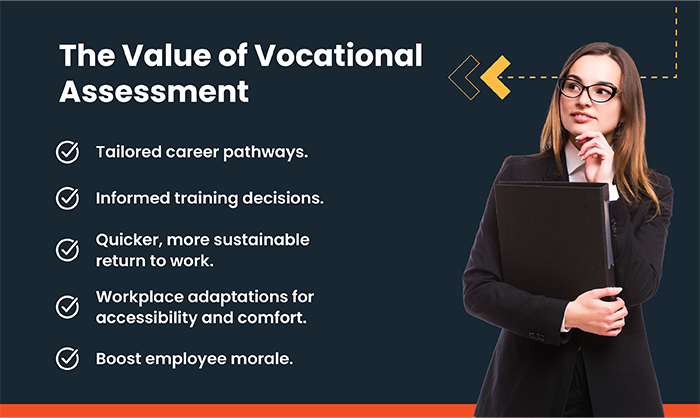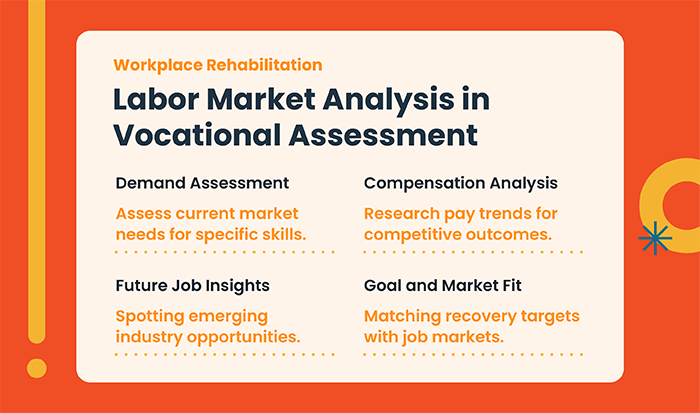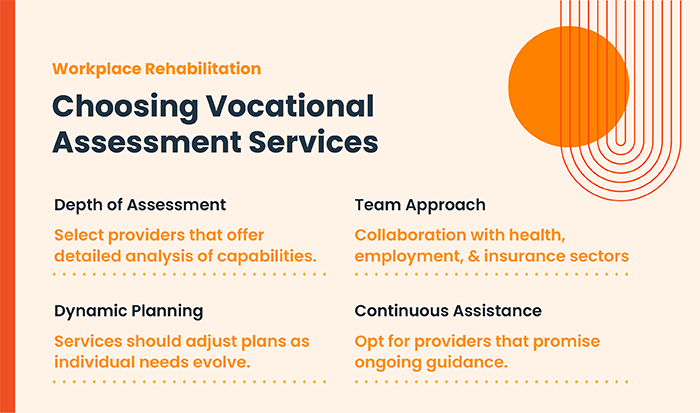Our Services
Resources
For Businesses
For Workers
Update Jun 11, 2025 • 9 min read
Discover the role of vocational assessment in workplace rehab, and how it helps individuals return to work after injury or disability.


Vocational assessment is a detailed evaluation process that helps individuals understand their skills, interests, abilities, and work values to make informed decisions about their careers. Vocational assessment is a cornerstone of occupational rehabilitation, playing a critical role in guiding individuals back to suitable employment after an injury or illness.
Just like stale business strategies can drag a company down, a weak vocational assessment can make getting back to work tougher than it should be. If we don’t nail down what someone can really do, they might end up in a job that’s not a good fit, leading to frustration and a hit to their confidence. A solid vocational assessment takes a close look at a person’s skills, spots the gaps, and sets up a plan for success. It’s not just about landing any job; it’s about finding the right one that keeps them motivated and fulfilled for the long haul.
A vocational assessment is a detailed evaluation process. It’s designed to understand a person’s job skills, interests, strengths, and any areas where they might have difficulties, following an injury or health condition. This assessment helps identify the types of jobs and work settings that would be a good fit. It’s particularly helpful for those who are getting ready to work for the first time or planning to re-enter the job market after a period of absence.

Vocational assessment is integral to occupational rehabilitation, serving as the foundation for creating personalised return-to-work plans. It ensures that individuals are matched with jobs that are not only suitable to their skills and interests but also conducive to their health and recovery.

Labor Market Analysis (LMA) is a powerful tool often utilised within the realm of vocational rehabilitation and employment services. It’s designed to interpret the dynamics of the job market, providing invaluable insights that help align workforce strategies with economic opportunities. This analysis is particularly beneficial for individuals recovering from injury or illness as they navigate their return to work.
“Labor Market Analysis tailors job searches to current employment opportunities, renumerations, physical job requirements, employer expectations, and job availability, aiming to identify roles that align with workers’ rehabilitation and capabilities.”

An LMA typically includes several components that paint a comprehensive picture of the job market:
Consider the case of an individual recovering from a workplace injury. An LMA can provide a clear pathway for this person by highlighting which sectors could accommodate their new physical capabilities or work restrictions. For example, if an LMA shows a rise in demand for administrative roles that offer ergonomic work environments, a person with a physical injury might pursue such opportunities.

Selecting a provider experienced in vocational assessment within the context of occupational rehabilitation is crucial. Look for services that offer:
Vocational assessment is a vital component of occupational rehabilitation, offering a pathway to meaningful and sustainable employment for individuals recovering from injury or illness. By understanding and utilising these assessments, individuals can achieve successful outcomes in their rehabilitation journey and career development.
Vocational assessment for workplace rehabilitation benefits a wide range of individuals, following workplace injuries or health conditions that affect their ability to work. They must also need vocational rehabilitation services to obtain, maintain, or return to a job and are expected to benefit from employment that the services will help them secure.
The benefits of vocational rehabilitation are tailored to individual needs and can include counseling, vocational assessment to evaluate skills and interests for job placement, and on-the-job training. This personalised approach ensures that each individual receives the support they need to return to work effectively, taking into account their abilities and medical constraints. For example, in some cases, minor adjustments to the job or workplace may be sufficient, while in others, more extensive support and training may be necessary.
This comprehensive approach aids in the reintegration of individuals into the workforce, making vocational assessment a crucial component of workplace rehabilitation. It not only helps in identifying suitable employment opportunities but also provides the necessary training and support, enabling individuals to achieve and maintain employment, thus fostering independence and improving their quality of life.
After a vocational assessment for workplace rehabilitation, several steps and services can be expected to facilitate the return to work. A vocational evaluation is conducted to ascertain the individual’s abilities, aptitudes, and interests. Based on this, a return-to-work plan is developed, which may include resume development, job development, placement services, and potentially retraining or job redesign if returning to the previous employer is not viable.
Rehabilitation services also focus on identifying suitable new employment pathways, tailoring plans to the individual’s needs, abilities, and interests, and considering retraining and upskilling where necessary. This holistic approach aims to improve motivation, develop job-seeking skills, and facilitate a successful return to work.
In summary, after a vocational assessment, one can expect a comprehensive and supportive process aimed at returning to work, which may include evaluations, plan development, training, and legal avenues for disputes or appeals. This process is designed to ensure the individual can return to suitable employment, considering their physical and psychological capacities.
Vocational assessments can indeed assist with accommodations in the workplace for rehabilitation. These assessments help facilitate the interaction between the employee/applicant and the employer, building confidence that the individual can perform the essential job functions with or without reasonable accommodations. The process is tailored to individual needs, considering various factors such as job requirements, the individual’s abilities, and potential accommodations to support their return to work or retention in employment.
*The details in this article were correct and current when it was written. However, changes in business practices, policies, and other pertinent areas may have occurred since then. Readers should confirm the current validity of the content on their own.


Want to Make a Change? Share with Anyone, Anywhere.
Home » Workplace Rehabilitation » Every Question About Vocational Assessment, Answered
Be the first to know about our free training programs, videos, articles, and exclusive offers.

AusRehab acknowledges the Traditional Custodians of Country throughout Australia, recognising their deep ties to land, sea, and community.
We pay our respects to Elders past and present and extend our respect to all Aboriginal and Torres Strait Islander peoples today.
© 2025 AusRehab